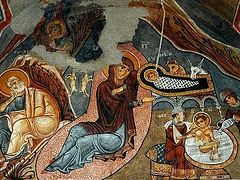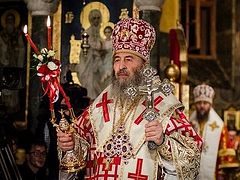This interview was taken with Metropolitan Onuphry at the beginning of the year 2008. At the time he was Metropolitan of Bukovina, which is also his native land. Now this wise and spiritually experienced hierarch is Metropolitan of Kiev and All Ukraine, the head of the autonomous Ukrainian Orthodox Church; and much of what he foresees in this interview has already happened in his country. He was a witness to the political vector already set in motion.
* * *
In Roman times, Bukovina was a part of Dacia (the territory of modern Romania). The region’s wealth of nature greatly benefited the Tivertsi, the Croats and other southern Slavic tribes. Bukovina was made part of Kievan Rus’ in the X-XII, and at the same times the first seeds of the Orthodox faith were sewn, which would later penetrate into the everyday life and culture of this multinational area. Then Bukovina joined the Kingdom of Ruthenia and later the Principality of Moldova (both were Orthodox states), in XVI–XVIII centuries the region was subdued by the Ottoman Empire and was then under the Austrian Empire’s control until 1918. When a wave of revolution crashed through Bukovina (Chernivtsi Oblast), the region was under the flag of the Kingdom of Romania. It was only in 1940 when Stalin’s iron hand marked the border and Bukovina joined the Ukrainian SSR, as well as other regions of western Ukraine. Unlike Lviv, Ternopil, Rivne, Ivano-Frankivsk and partly Khmelnytskyi provinces, where Vatican leverage prevailed (as a result of the 1596 Union of Brest and Polish dominance), Bukovina managed to preserve its Orthodox uniqueness despite all conflicts of history. Talking to the clergy, the monastics and the laymen, and state officials, it seems obvious that the region’s religious unity could in many aspects be attributed to the weight of Metropolitan Onuphry of Chernivtsi and Bukovina, then a permanent member of the Holy Synod of the Ukrainian Orthodox Church and the chairman of the Synodal Canonization Commission.
—Vladyka, the feast of Nativity of Christ has come, and now it is a state holiday in the Ukraine. At the same time, the Christian holiday is imbued with secular or non-Orthodox features. An ordinary Ukrainian associates the feast with Santa Claus, the Christmas goose and the gaiety of Christmas parties. The great mystery of the Savior becoming one of us is paling into insignificance...
—Having gained the liberty of confessing the faith, a believer, first of all, strives for widening, deepening and enriching the faith; but if the person does not wish to stay within the Church, while considering himself a Christian (he doesn’t “practice the faith”, as we tend to characterize it now), one gets down to making up some clichés, including ones for celebrating Christian feasts. The same is true for society in general. The media, state officials holding various ranks and ordinary people unrelated to the Church start to organize “Christmas shows”. These clichés, containing Santas and the geese, were borrowed from the West. Moreover, looking at our society, which proclaimed religious liberty and the so-called “overthrowing of atheism”, we can see how faithful it really is. The Nativity of Christ has become a state holiday, but no one explained what people should do on these holy days and how they should behave, how to take the right way of Christian self-improvement. In fact, those who have the authority to proclaim it do not know it themselves. It reminds me of the blind leading the blind...
—And what would be the opposite of this?
—There is only one thing—a life according to the law of Christ. Those who believe they are Christians should live like Christians, live under the law of faith. By doing so they will set an example for the others. Words and pompous sermons are fruitless on their own.
—The Church appeals to a large number of people, but nevertheless make no steps towards it. How can we make the Christian value scale clear for them, so that the Christmas goose would be just an element of the feast, and not the feast itself?
— There should be a calling in the heart: A man cannot come to the Father, unless He calls him. The heart feels Divine grace under certain conditions—if the man loves the truth. There are people who love the truth and despise a lie, and they easily receive grace. Those who see spiritual values easily receive grace. If a person is perfectly happy with his goose, he is unable to feel grace. The Lord grants him Divine grace, but he is unable to feel it, and he sticks with the goose.
—What can a priest do in this situation?
—What can a priest do? It is not the priest but God Who attracts a man. Clergymen are just mediators. The priest can be compared to a doctor. Some people believe it is a doctor who grants us good health, but, in fact, it is the Lord. Doctors sometimes do their best to restore physical harmony, but if God does not heal the person, he passes away. The priest for his part tries to restore spiritual harmony, saying, “If you want peace to settle in your soul, do not steal, do not commit adultery, do not commit other sins—by doing those thing you harm your own soul, it is abnormal for you, it is your infirmity and you should refrain from it. You should have thoughts like this, you should not envy or put on airs. Therefore, the priest helps the person put his mind and behavior under certain rules. Seeing this response, the Lord gives him His grace so that he can fight his passions and infirmities. If God leaves the person without Divine strength, without His grace, he remains alone with his problems.
If we love God, we love everyone—our father and mother, our neighbor and fatherland, as well as other peoples. If we do not love God, we will never be able to love anyone; we will always be prone to committing a sin. A man is inferior without God, but he gradually comes to understand that we should seek rules of living that are eternal and unchanged. The easiest way to find them is in the Church. We cannot cure ourselves of a disease on our own. The same is true of the Church—we cannot establish ties with God outside of it. The Church is a spiritual hospital possessing the fullness of Christian experience. In the Church we increase our faith and improve our minds, and it is easier to turn to our Heavenly Father. And the Father will never leave us alone.
Once an unmarried elderly woman came up to me saying, “Vladyka, what family would you advise me to choose to end my days with? Some families have offered me their help, and they are all religious. How should I decide?” I learned that she had not been married and devoted herself to taking care of the ill, poor and feeble, and those who needed help. And when the time came and she was in need of help, complete strangers—I mean, those who she never had never taken care of—started to invite her to their home to spend the last part of her life. She was a paragon of Christian life, who did everything for God, and then God took her into His care.
—Vladyka, people living some fifteen years ago in the multinational state [i.e., the USSR] were amiable towards each other, and the ordinary worker was in favor. They believed in tomorrow and didn’t fear for their future or the future of their children.
—It’s true—values similar in part to Christian ones were cultivated during those times. Christ spoke about brotherhood, peace and love, but His words were about Divine love, about the world of spirit and grace, about love for God and neighbor. Negating God, that society, which is now gone, had in its foundation Christian principles applied to mediocre consumer attitudes. It was an atheistic Romanticism, building the Kingdom of Heaven on earth but—as Dostoevsky said—without God and without believing in Him; it all ended tragically. Nevertheless, there was much positive at those times: moral, patriotic and cultural ideals. The Great Patriotic War [World War II] was a period of great tribulation but at the same time it consolidated the nation. Moreover, the Church had more freedom, as the soviet ideologues were perfectly aware they would never be able to win the war without God and faith.
—And how deep are the differences now! People of the same nationality, living in the same region (not to mention the state) are belligerent as they have different political views and prefer different political idols!
—There is no divine grace in morbid rivalry. God’s grace helps us live peacefully in a very multifaceted community. Grace teaches us and gives us the strength to be patient with our neighbor, to accept them as they are. Without Divine grace, everyone is an enemy—even our relatives—and this is because we have no peace in our hearts. In such circumstances we believe that our annoyance is the fault of those around us. The holy confessors [of the Russian land] lived in camps, with both political prisoners and incorrigible criminals, gangsters, thieves and murderers. The saints, however, got along with them, loved them and were patient. And the criminals came to them for help. None of the confessors preached—that was not possible—but they had a peaceful heart and were at peace with the Lord. When we are at peace with God, everyone around us can feel this peace. If the community lacks peace, it does not have Christ in its heart. The nation should live in one accord, seek true values, find them and merge together, and not the opposite. If we would stick to this, we would not have to see all that is happening in this time of unrest.
—And what do you think about the president’s drive to demolish all memorials of the totalitarian past?
—We have heard a lot of different ideas and initiatives, and the absolute majority of them are literally based on populism. Quite little has really been done.
—Are the announcement that 2008 [the year of this interview] will be a year commemorating victims of Holodomor (the Great Famine, derived from “to kill by starvation”) and demand the recognition of the Ukrainian Genocide of 1932-1933 also based on populism?
—We should first overcome the present holodomor. Sometimes in the morning when dawn breaks, I look out of the window to see a tidily dressed elderly man. He looks around and then dives into a garbage bin, rummages and takes something from there. He’s ashamed, it’s clear, but hunger pushes him into this humiliation. The diocese, by the way, serves food to the homeless, and there are many homeless in the country. Retirees come to us with their containers, take some food and leave for their homes. If they were not starving, would they really come to get a portion of soup and a slice of bread? We should first fight this poverty, and then direct our attention to what is now a part of our history.
I do not think it was the president who came up with these ideas; they were produced within certain groups in the West and then came to our country. These ideas are based on the rivalry of peoples. According to the ideology, the Ukrainian totalitarian past is associated with Moscow, and consequently with modern Russians. Hence, the government will be cultivating hostility in the upcoming year to escalate an incitement to hatred and polarity among the people. At the same time, the people will be convinced that Russia flourished in the 1920-s and 1930-s, while the Ukrainians had to face starvation. However, history shows that the severest famine was in Russia’s central and southern parts, in Povolzhye [the region along the Volga River]. Even Lenin spoke in his letters about human cannibalism and suggested, under this pretext, to instigate the confiscation of Russian Orthodox Church property and shoot as many clergymen as possible. Povolzhye, you know, has always been Russia’s most fertile region, with its fruitful fields, meadows, and water reserves. What can be said about Russia’s northern areas, Arkhangelsk and Murmansk, where nothing can be grown?
— There is a committee for spirituality and culture in Verkhovna Rada. How can people who don’t have any Church experience and are not religious deal with issues of spirituality?
—All of the Ukrainian people’s best things, every distinction the country has managed to achieve throughout the course of its history, are rooted in the Orthodox faith. These are all fruits of our nation’s Orthodox life, and if we want to maintain these good things and these distinctions we should preserve the faith that granted them to us. Unfortunately, the modern committees are established to satisfy all these “spirits”, but we should not forget there are both good and evil spirits. And we need committees for good spirituality. Otherwise, why don’t we just legalize the numerous cults and the actions of schismatics, who expect to get Divine grace?1 What we have is: Swing the censer at anyone you want, the main thing is that they give you money.
—And what should we do to bring people back to the Church, to Orthodoxy, to our ancient spiritual origin?
—Initiating a basic course on Orthodox culture at the schools would be the most common measure, as we live in the Orthodox country. High-ranking politicians talk about it; they fight for some national Local Church, but in fact, against God and the Orthodox faith. We need a school subject on Orthodox Christianity. The children should learn about the faith of national heroes, scientists and cultural luminaries, and our ancestors, whom history knows as very positive figures. It is extremely important to bring up the younger generation on the spiritual traditions of the Orthodox Church.
We should neither watch on TV nor read in newspapers the propaganda of various occultists, satanists, sectarians and the mentally deranged—they devour our minds and souls. The media would do better to promote spiritually valuable, healthy Orthodox ideas about the meaning of life, the present and the future. We also need healthy moral censorship. In addition, we all should remember what St. Seraphim of Sarov said, “Acquire the Spirit of Peace and a thousand souls will be saved around you.” The Ukraine has 40 million inhabitants—let us make a small calculation (he says smiling): According to the saint, if forty thousand people acquire the Spirit of Peace, the whole country will be in Divine grace.
—Your Beatitude, what does the feast of Nativity mean to you personally?
—I believe, and everyone would agree that the Nativity of Christ is the feast of reconciliation between heaven and earth. As you know, the angels sang to the shepherds “Glory to God in the highest and on earth peace, good will to all people.” It is not without reason that—taken outside the Church service—this is a family feast. Weaknesses, little or big disputes, various quarrels are typical of any family. But they all disappear at Christmas, all grievances are settled and misunderstandings clear up. The feast reminds that we should live in love for God and each other, that we should live in peace. If a person comes to Christ and follows Him, peace will surely come into his heart. And this is true human happiness.






